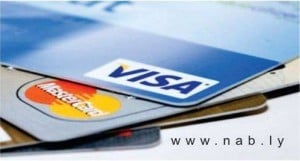By Sami Zaptia.

London, 16 May 2016:
The North Africa Bank, a privately-owned Libyan bank, announced that online applications for Visa debit cards . . .[restrict]started yesterday.
Earlier it had announced that it would start offering Sharia-compliant loans and Mastercard debit cards as well as foreign currency transfers abroad for educational and health purposes, as is permitted by the Central Bank of Libya.
Credit cards in Libya are not offered as they accrue interest which conflicts with Islamic Sharia banking. NAB has also launched its POS service through its ATM card.
The Libyan banking sector is relatively underdeveloped with very few banking services on offer to customers in a country which is very much cash-based. However, Libya has been going through a major economic crisis since the political split of the country.
The economic crisis has been caused by a collapse of international crude oil prices, an equal collapse of Libya’s oil production and a loss of confidence in the political situation.
The crisis has led to a shortage of cash at banks, as Libyans choose to hoard their cash at home. This has led to withdrawal limits being enforced and queues forming at banks. Some banks have been attacked by armed angry customers unable to withdraw their money.
This crisis has, however, encouraged the use of and demand for both debit cards and POS systems at retail outlets as one measure to mitigate the cash shortage crisis. However, banks have been slow to react and many new debit card clients have been waiting for months if not a year or more to apply for a new debit card. Banks have been slow to order and receive new debit cards.
Equally, debit cards have played part in foreign currency financial corruption as bank employees have restricted their issue to their cronies with multiple cards being issued to a small number of black market currency dealers.
The CBL was forced to decree that debit cards are to be issued only through the National ID Number in order to eliminate their multiple issue to the same person.
Moreover, the foreign currency shortage has meant that often – and some critics would say most of the time over the last two years – the debit cards have not been working abroad. Many Libyan students abroad, relying on their Libyan debit cards to receive money from family back in Libya, have been left without any money as their debit cards failed to issue any money.
This has generally applied to debit cards of all Libyan banks. [/restrict]








